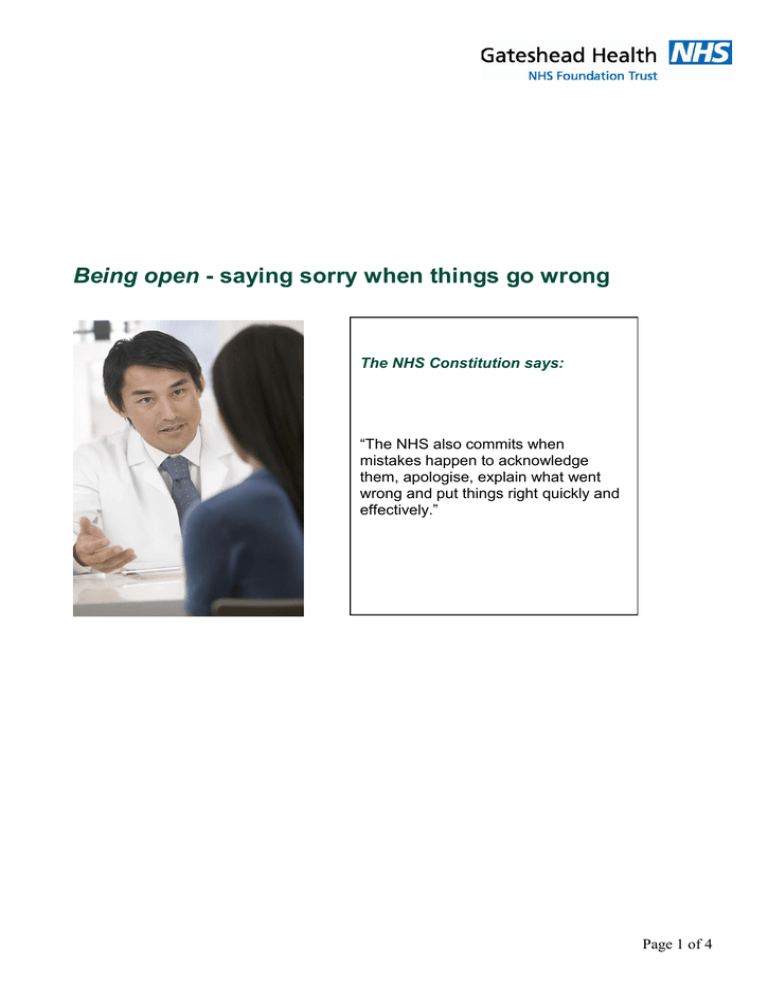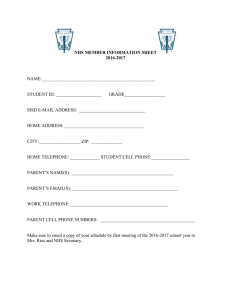Being open - saying sorry when things go wrong
advertisement

Being open - saying sorry when things go wrong The NHS Constitution says: “The NHS also commits when mistakes happen to acknowledge them, apologise, explain what went wrong and put things right quickly and effectively.” Page 1 of 4 Being open - saying sorry when things go wrong Each day more than a million people are treated safely in the NHS. However, occasionally, something goes wrong and a patient is harmed. For example a patient may be prescribed or receive the wrong type of medication or the wrong dose. At Gateshead NHS Foundation Trust we do as much as possible to keep you safe while you are in our care. The staff work hard to deliver the highest standards of healthcare to all patients and we aim to minimise the occurrence of adverse outcomes. Patients and their families cope much better in dealing with things that go wrong in their treatment and care when the healthcare staff are open and honest about the circumstances surrounding these mistakes. Healthcare staff are often cautious about apologising for things that go wrong as they worry that they might say the wrong things, make the situation worse and may be automatically blamed for the mistake. However in Gateshead we feel it is vital for patients, relatives and their carers to receive a full explanation if these circumstances do occur and we refer to this as „Being open’. By Being open we make a commitment to our patients to: o o o o o o Explain exactly what went wrong and, where possible, why things went wrong; Offer an apology for what has happened; Ask what you think went wrong and why; Tell you what we will be implementing to prevent it from happening again; Let you ask questions; and Offer support and counselling services that may be able to help. What to expect In Gateshead if you have been involved in an incident which resulted in harm you can expect the following to happen: o You will be given a Being open link person. o You will be invited to a meeting to discuss what happened. Prior to this meeting you will be formally advised, in writing, of the identities and roles of all people attending the Being open discussion. If you have any objection to the staff attending the meeting this should be raised with your Being open link person. o If you have any specific requirements in relation written or verbal communication, for example you require an interpreter or Braille; you should inform your link person so that this can be arranged. o You will be invited to consider who you would prefer to be present from within your circle of carers/friends/family in advance of the meeting o You will receive an apology for what has happened. o An investigation will be carried out to identify the facts. Although an investigation would be initiated as soon as possible it can sometimes take weeks or months to complete. This may mean that at the first meeting no one can tell you exactly what went wrong. There will, however, be opportunities for future meetings and your link person will keep you updated with how the investigation is going and any new facts that may emerge. Page 2 of 4 o You will be given the opportunity to explain your understanding of what happened. o The information you are given will be explained clearly and any questions you have will be answered. o There will be notes taken of the meetings so that we can be sure that we understand the issues and to make sure that we can follow up the meeting and any questions in writing. o An explanation of what happens next in terms of the long-term treatment plan and the investigation findings. You will be given the opportunity to be involved in this process. o You will be offered practical and emotional support. o You are entitled to continue to receive all usual treatment and continue to be treated with respect and compassion. If you wish for your healthcare needs to be transferred to another team you should let your link person know. o If you would like to make a formal complaint the information you will need will be provided. The NHS can learn from people who have been harmed whilst in their care. Sharing what happened when things go wrong can help others prevent the same mistakes happening to someone else. You may feel anxious about talking through your experience with the people who have been treating you, especially if you need further treatment. We assure you that this will not have a negative impact on your future care. Talking through the issues may help you cope better in dealing with what has gone wrong if you understand why it went wrong in the first place. Further support The website www.patient.co.uk provides information on a range of support groups which could give you further information, help or advice. If you are not able to access the internet, your Being open link person can provide you with a list of support groups. The following support groups may be of particular relevance to you: (to be completed by link person) Page 3 of 4 Your Being open link person is: Name: Title: Telephone: Email: For further information on Being open go to www.nrls.npsa.nhs.uk Data Protection Any personal information is kept confidential. There may be occasions where your information needs to be shared with other care professionals to ensure you receive the best care possible. In order to assist us improve the services available your information may be used for clinical audit, research, teaching and anonymised for National NHS Reviews. Further information is available in the leaflet Disclosure of Confidential Information IL137, via Gateshead Health NHS Foundation Trust website or the PALS Service. Information Leaflet: Version: Title: First Published: Last Review: Review Date: Author: NoIL297 2 Being Open July 2010 July 2012 July 2014 Stephanie Gair, Risk Management Facilitator This leaflet can be made available in other languages and formats upon request Page 4 of 4


